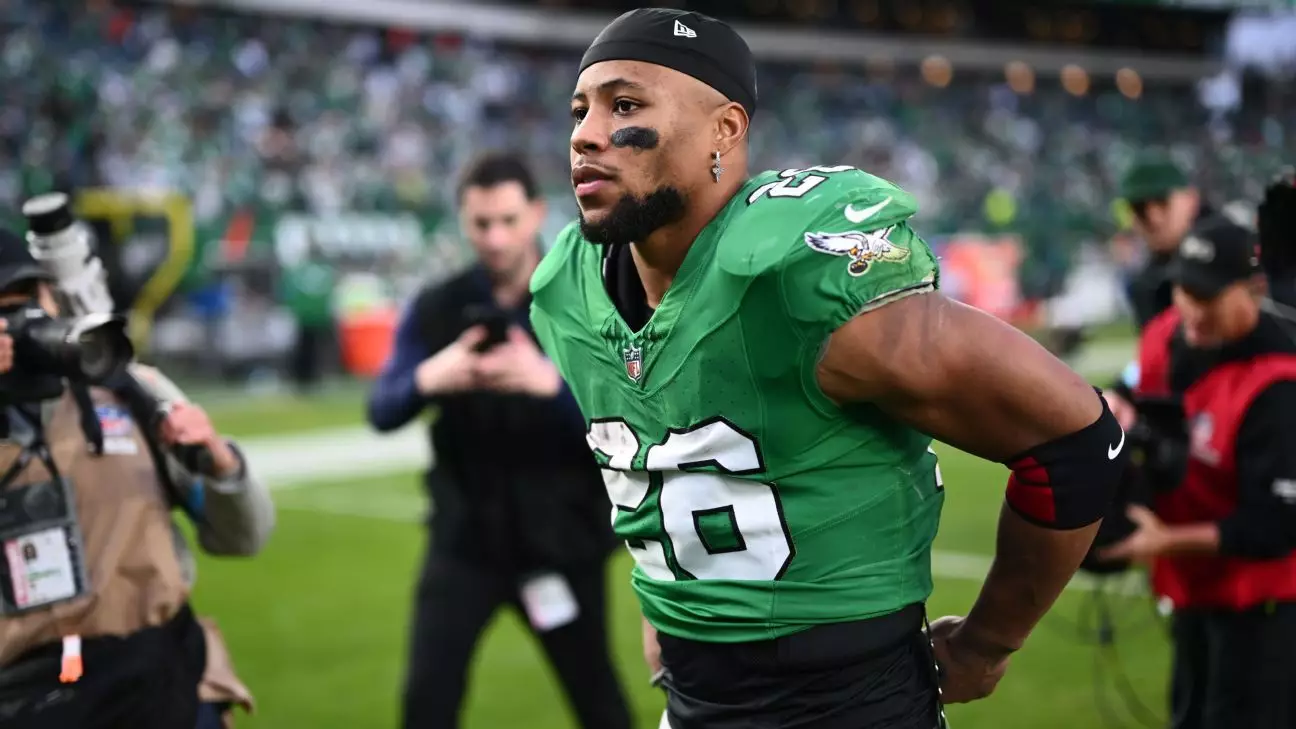As the Philadelphia Eagles gear up for their upcoming game against the New York Giants, a unique set of circumstances presents a pivotal decision for head coach Nick Sirianni. With uncertainty looming over whether Saquon Barkley will attempt to shatter the long-standing NFL single-season rushing record, the situation opens the floor for deeper analysis of both strategic considerations and the moral imperatives of sportsmanship and player welfare.
Saquon Barkley stands on the brink of NFL history, needing just 101 yards to eclipse Eric Dickerson’s legendary record of 2,105 rushing yards established in 1984. This ambitious goal not only represents personal achievement for Barkley but also holds immense historical significance. Meanwhile, the Eagles have already secured their playoff position, having clinched the NFC East title and settled into the No. 2 seed. This duality creates a compelling narrative that pits individual aspirations against a broader team agenda.
While the allure of witnessing Barkley achieve this milestone captures the imagination, it inherently invites a philosophical question: should individual accolades take precedence over team strategy and player health, especially during a playoff push? Coaches often grapple with similar dilemmas, weighing the desire to win games against the need to safeguard their players for more critical matchups ahead.
Sirianni declared his intent to consult widely—including his coaching staff, general manager Howie Roseman, and even team owner Jeffrey Lurie—before finalizing a decision regarding Barkley’s playing status. This level of deliberation signals an understanding that decisions made in moments like these extend beyond mere statistics; they affect team morale, player future, and the organization’s ethos.
He articulated a guiding principle: “What’s the best thing for the team?” This underscores a responsible coach’s approach to leadership. The decision should not only consider current performance but also the long-term implications of risking an injury to a star player. With players like Barkley, the fine line between ambition and caution is razor-thin.
Sirianni’s past decisions reveal a trend toward prioritizing individual achievements on occasion. In 2021, he allowed rookie wide receiver DeVonta Smith to play in a meaningless season finale to break a franchise record while resting other starters—an instance where individual milestones were successfully integrated into a broader team narrative.
For Barkley, the upcoming game is an opportunity to etch his name in the history books, yet his immediate response to the situation speaks volumes about his character and understanding of larger goals. He expressed both willingness and acceptance, stating, “Whatever his decision is, I’m all for it.” This quote reflects his commitment to team success, underlining that while individual records are enviable, winning championships is the endgame.
What Barkley’s stance elucidates is a prevalent mentality in professional sports: the balance of personal achievement and collective responsibility. Barkley’s desire for a championship banner underscores a mature understanding that personal milestones, while important, are more meaningful when paired with team success.
Ultimately, as the Eagles navigate these murky waters, they find themselves confronting questions inherent to the nature of sports. The complexities of player welfare, competitive integrity, and the pursuit of greatness are ever-present. In a league characterized by its physical demands, protecting players while striving for accolades is a layered challenge that requires thoughtful navigation.
As the game approaches, all eyes will be on Sirianni and Barkley to see how they strike this precarious balance. Whether Barkley gets his chance to chase history or sits out to fortify the team for the postseason, the decision will undoubtedly reflect a broader commitment to the sport’s spirit—prioritizing both excellence and teamwork in pursuit of glory.

